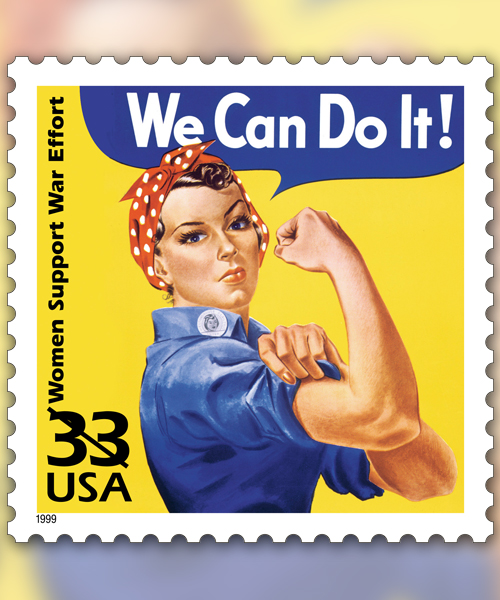
In 1999, USPS issued a Rosie the Riveter stamp featuring J. Howard Miller’s famous illustration of the labor icon.
To help mark Women’s History Month, here are some facts about women in the United States.
1. The United States has more women than men. There were 164 million women in the nation as of July 2016, according to the latest data available from the U.S. Census Bureau. By comparison, the number of men was 159.1 million.
2. Women’s role in the American labor force has grown dramatically. According to the U.S. Department of Labor, women’s participation in the labor force has climbed from 32.7 percent in 1948 to 56.8 percent in 2016. Meanwhile, the proportion of women workers with college degrees has almost quadrupled since 1970: More than 40 percent of women in the labor force had degrees in 2016, compared with 11 percent in 1970.
3. Women dominate some fields, but not others. Ninety-eight percent of speech-language pathologists and 93 percent of dental assistants are women, according to the Labor Department. However, only about 1 percent of heating, ventilation and air conditioning mechanics and installers are women.
4. Women have narrowed the gender pay gap, though they still lag men in pay. According to the Pew Research Center, the median hourly earnings for women workers in the United States were $16 in 2016, up from $12.48 in 1980 (after adjusting for inflation). Men earned a median hourly wage of $19.23 in 2016, down slightly from $19.42 in 1980. In other words: In 2016, the median working woman earned 83 cents for every dollar earned by men, compared with 64 cents for every man’s dollar in 1980.
5. The Postal Service workforce includes about 288,000 women. This represents about 45 percent of all employees. The organization’s history includes pioneers such as Mary Fields, the first known African-American woman mail carrier, and Katherine Stinson, the first woman pilot to carry mail. Additionally, many women have been honored on stamps over the years, including lawmakers, philatelists and others.
Source: USPS
